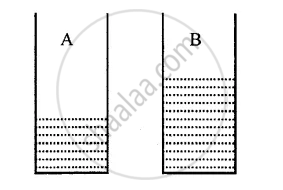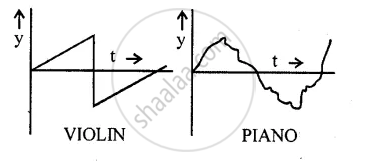Advertisements
Chapters
![Selina solutions for Concise Physics [English] Class 8 ICSE chapter 7 - Sound Selina solutions for Concise Physics [English] Class 8 ICSE chapter 7 - Sound - Shaalaa.com](/images/concise-physics-english-class-8-icse_6:53235d1491ff438fb024a108557878b3.jpg)
Advertisements
Solutions for Chapter 7: Sound
Below listed, you can find solutions for Chapter 7 of CISCE Selina for Concise Physics [English] Class 8 ICSE.
Selina solutions for Concise Physics [English] Class 8 ICSE 7 Sound Objective questions [Pages 135 - 136]
When sound propagates in air, it does not carry energy with it.
True
False
In a longitudinal wave, compression and rarefaction are formed.
True
False
The distance from one compression to nearest rarefaction is called wavelength.
True
False
The frequency is measured in second.
True
False
The quality of a sound depends on the amplitude of wave.
True
False
The pitch of sound depends on frequency.
True
False
Decibel is the unit of pitch of a sound.
True
False
The time period of a wave is 2 s. Its frequency is ..........
The pitch of a stringed instrument is increased by .................. tension in string.
The pitch of a flute is decreased by ................... length of air column.
Smaller the membrane, .................. is the pitch.
If a drum is beaten hard, its loudness ................
A tuning fork produces sound of ................... frequency.
Match the following
| column A | column B |
| (A) Amplitude | (1) frequency |
| (B) Frequency | (2) amplitude |
| (C) Loudness | (3)maximum displacement on either side |
| (D) Pitch | (4) presence of other frequencies |
| (E) Waveform | (5) 1/ time period |
Select the correct alternative
Sound can not travel in
solid
liquid
gas
vacuum
When sound travels in form of a wave
the particles of medium move from the source to the listener
the particles of medium remain stationary
the particles of medium start vibrating up and down
the particles of medium transfer energy without leaving their mean positions.
The safe limit of loudness of audible sound is
0 to 80 dB
above 80 dB
120 dB
above 120 dB
The unit of loudness is _______.
cm
second
hertz
decibel
In a piano, pitch is decreased by
using thicker string
increasing tension
reducing length of string
striking it hard Ans.
Selina solutions for Concise Physics [English] Class 8 ICSE 7 Sound Short/Long Answer questions [Pages 136 - 137]
How does sound travel in air?
What is longitudinal wave?
Explain the mechanism of the formation of a longitudinal wave when the source vibrates in the air.
Define the following terms :
(a) Amplitude
(b) Frequency
(c) Time period.
Obtain relationship between the time period and frequency.
Name three characteristics of a musical sound.
Which of the following determines the loudness of a sound wave?
Wavelength
Frequency
Amplitude
How is loudness related to the amplitude of wave?
If the amplitude of a wave is doubled, what will be the effect on its loudness?
How does the wave pattern of a loud note differ from that of a soft note? Draw a diagram.
Name the unit in which the loudness of sound is expressed.
Why is the loudness of sound heard by a plucked wire increased when mounted on a sound board?
State three factors on which loudness of sound heard by a listener depends.
What determines the pitch of a sound?
Name the characteristic of sound related to its frequency
Name and define the characteristic which enables one to distinguish two sounds of same loudness, but of different frequencies, given by the same instrument.
Draw a diagram to show the wave pattern of high pitch note and a low pitch note, but of the same loudness.
Standing at a distance, how is it possible to detect the filling of bucket under a water tap by hearing the sound?
The frequencies of notes given by flute, guitar and trumpet are respectively 400 Hz, 200 Hz and 500 Hz. Which one of these has the highest pitch?
Figure shows two jars A and B containing water up to different heights. Which will produce sound of higher pitch when air is blown on them?

Two identical guitars are played by two persons to give notes of the same loudness and pitch. Will they differ in quality? Give reason for your answer.
Two musical notes of the same pitch and same loudness are played on two different instruments. Their wave patterns are as shown in figure.

How do they differ in
(a) loudness,
(b) pitch and
(c) quality
Which characteristics of sound makes it possible to recognize a person by his voice without seeing him?
State the factors that determine
(a) the pitch of a note.
(b) the loudness of the sound heard.
(c) the quality of the note.
Name the characteristic of the sound affected due to a change in its
(a) amplitude (b) waveform (c) frequency.
Figure shows four waves A, B, C, and D

Name the wave which shows
(a) a note from a musical instrument,
(b) a soft note
(c) a shrill note.
How is the pitch of sound in a guitar changed if (a) thin wire is used, (b) wire under less tension is used?
Selina solutions for Concise Physics [English] Class 8 ICSE 7 Sound Numericals [Page 137]
Two waves of the same pitch have amplitudes in the ratio 1 : 3 What will be the ratio of their
- loudness,
- pitch?
Two waves have frequencies 256 Hz and 512 Hz, but same amplitude. Compare their (i) loudness, and (ii) pitch
Two waves have the same pitch but their amplitudes are in the ratio of 1 : 2. Draw a figure to show the two waves.
Two waves of the same amplitude have frequencies 256 Hz and 512 Hz respectively. Represent the two waves in the graphical form.
Solutions for 7: Sound
![Selina solutions for Concise Physics [English] Class 8 ICSE chapter 7 - Sound Selina solutions for Concise Physics [English] Class 8 ICSE chapter 7 - Sound - Shaalaa.com](/images/concise-physics-english-class-8-icse_6:53235d1491ff438fb024a108557878b3.jpg)
Selina solutions for Concise Physics [English] Class 8 ICSE chapter 7 - Sound
Shaalaa.com has the CISCE Mathematics Concise Physics [English] Class 8 ICSE CISCE solutions in a manner that help students grasp basic concepts better and faster. The detailed, step-by-step solutions will help you understand the concepts better and clarify any confusion. Selina solutions for Mathematics Concise Physics [English] Class 8 ICSE CISCE 7 (Sound) include all questions with answers and detailed explanations. This will clear students' doubts about questions and improve their application skills while preparing for board exams.
Further, we at Shaalaa.com provide such solutions so students can prepare for written exams. Selina textbook solutions can be a core help for self-study and provide excellent self-help guidance for students.
Concepts covered in Concise Physics [English] Class 8 ICSE chapter 7 Sound are Properties of Sounds, Characteristics of a Sound Wave, Sound, Propagation of Sound, Representation of a Wave, Loudness and Intensity, Pitch (or shrillness) and frequency, Quality (Or Timbre) and Wave Form, Monotone, Production of Sound, Making a Musical Toy.
Using Selina Concise Physics [English] Class 8 ICSE solutions Sound exercise by students is an easy way to prepare for the exams, as they involve solutions arranged chapter-wise and also page-wise. The questions involved in Selina Solutions are essential questions that can be asked in the final exam. Maximum CISCE Concise Physics [English] Class 8 ICSE students prefer Selina Textbook Solutions to score more in exams.
Get the free view of Chapter 7, Sound Concise Physics [English] Class 8 ICSE additional questions for Mathematics Concise Physics [English] Class 8 ICSE CISCE, and you can use Shaalaa.com to keep it handy for your exam preparation.
